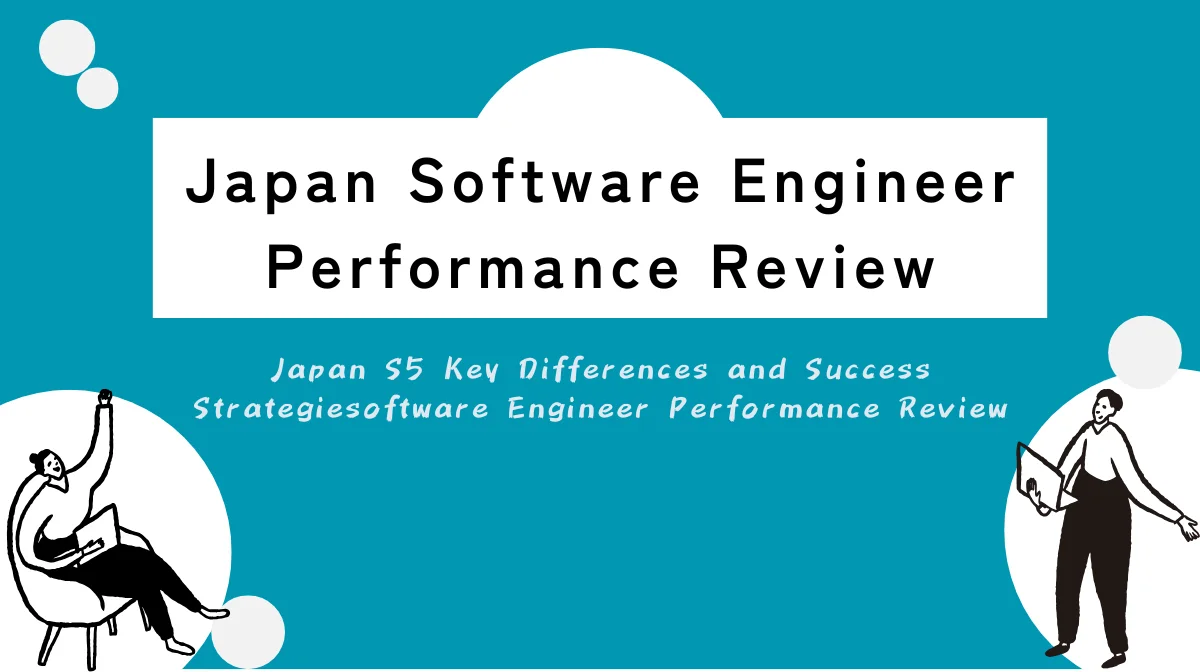Foreign software engineers in Japan often struggle with performance reviews despite strong technical skills. Japan’s evaluation system emphasizes teamwork and cultural adaptation over individual achievements.
This guide explains key differences from Western practices and provides practical strategies for getting the recognition you deserve.
- Key differences in Japan’s performance review system.
- Strategies to improve your evaluation as a foreigner.
- How to find companies with fair review processes.
1.Understanding Japan’s Software Engineer Performance Review System
Japan’s performance review system operates on different principles than Western evaluation methods. Technical expertise matters, but companies prioritize teamwork, cultural integration, and long-term potential.
Team-First Evaluation Culture
Japanese companies evaluate engineers based on team contribution rather than individual achievements. Your ability to collaborate effectively often weighs more heavily than coding skills alone.
The evaluation process considers how well you integrate with colleagues, support team goals, and maintain workplace harmony. Engineers with strong technical abilities but poor team dynamics may receive lower reviews than those who balance both aspects.
Mixed Merit and Seniority Systems
Most Japanese companies blend traditional seniority-based promotion with modern merit-based evaluation. Both experience level and performance influence career advancement.
Companies increasingly value technical achievements, but factors like tenure, age, and organizational relationships still play significant roles. Understanding this balance helps set realistic expectations.
Implicit Communication Standards
Japanese workplace culture relies on unspoken understanding and indirect communication. Performance reviews include subjective criteria like “reading the atmosphere” and cultural sensitivity.
These implicit expectations challenge foreign engineers accustomed to direct feedback and clear metrics. Success requires learning subtle communication cues and adapting to Japan-specific workplace norms.
2.Key Differences in Software Engineer Performance Review: Japan vs. Other Countries
Understanding these differences helps foreign engineers navigate Japan’s evaluation landscape and adjust their professional approach.
Technical Skills vs. Collaboration Focus
Western Countries
Performance reviews center on individual technical achievements, code quality, and problem-solving capabilities. Companies measure outcomes like features delivered, bugs fixed, and system improvements.
Japan:
Technical skills matter, but collaboration and team harmony receive equal or greater weight. Communication with colleagues, group decision-making participation, and team morale support significantly impact reviews.
Short-term vs. Long-term Evaluation
Western Countries
Reviews focus on recent achievements within quarterly or annual periods. Companies evaluate immediate contributions and current skill levels.
Japan:
Evaluation takes a longer view, considering growth potential and future leadership capabilities. Companies invest in employees for decades and evaluate projected long-term value.
Direct vs. Indirect Feedback
Western Countries
Supervisors provide specific, actionable feedback about performance issues. Clear communication helps employees understand improvement areas.
Japan
Feedback tends to be subtle and indirect. Managers use phrases like “please consider alternatives” instead of directly stating problems.
Individual vs. Team Achievement Recognition
Western Countries:
Reviews clearly attribute achievements to specific individuals, making personal contributions easy to track.
Japan
Success is viewed as collective team accomplishment. Individual contributions are often framed as team achievements.
■Related Reading
Understanding cultural differences is crucial for career success. Learn about the broader workplace dynamics that influence performance evaluations in Japanese tech companies.
■日本でエンジニアとしてキャリアアップしたい方へ
海外エンジニア転職支援サービス『 Bloomtech Career 』にご相談ください。「英語OK」「ビザサポートあり」「高年収企業」など、外国人エンジニア向けの求人を多数掲載。専任のキャリアアドバイザーが、あなたのスキル・希望に合った最適な日本企業をご紹介します。
▼簡単・無料!30秒で登録完了!まずはお気軽にご連絡ください!
Bloomtech Careerに無料相談してみる
3.Common Challenges for Foreign Engineers in Japan’s Performance Review

Foreign software engineers face distinct obstacles when navigating Japan’s performance review process. Recognizing these challenges helps develop effective strategies.
Language and Communication Barriers
Strong Japanese language skills are essential for meaningful performance review participation. Technical expertise cannot compensate for communication difficulties during evaluations.
You need to understand Japanese business communication styles, including honorific language, meeting etiquette, and documentation standards. Poor communication can overshadow excellent technical work.
Cultural Misunderstandings
Western emphasis on individual achievement and self-promotion may be viewed negatively in Japanese workplace culture, which values humility and collective success.
Religious or cultural practices that conflict with Japanese work norms require careful navigation to avoid impacting performance evaluations.
Unclear Evaluation Criteria
Many Japanese companies use subjective evaluation criteria that aren’t clearly documented. Foreign engineers struggle to understand what behaviors and achievements lead to positive reviews.
Abstract concepts like “team spirit” and “cultural fit” play important roles but lack specific, measurable definitions.
Indirect Feedback Challenges
Japanese managers provide feedback through subtle suggestions rather than direct criticism. Foreign engineers may miss important improvement messages delivered through indirect communication.
This prevents understanding weaknesses and taking corrective action, ultimately impacting future performance reviews.
4.Proven Strategies for Successful Software Engineer Performance Reviews in Japan
These practical approaches help foreign engineers adapt to Japan’s evaluation system while maintaining technical excellence.
Effective Technical Achievement Communication
Present technical accomplishments in ways that align with Japanese team-focused culture:
Individual Focus (Avoid)
- “I optimized database queries and reduced response time by 40%”
- “My algorithm implementation solved the performance bottleneck”
Team Focus (Use)
- “Our team’s database optimization achieved 40% faster response times”
- “We resolved performance issues through collaborative algorithm development”
Use specific metrics to demonstrate value while emphasizing team collaboration and shared success.
Master Japanese Business Communication
Develop communication skills that support positive performance reviews:
Daily Communication Tips
- Report progress regularly with structured updates
- Ask for guidance before making significant decisions
- Share information proactively with team members
- Use appropriate business honorifics consistently
Meeting Best Practices
- Listen carefully before contributing ideas
- Frame suggestions as collaborative proposals
- Show respect for senior colleagues’ opinions
- Follow up on commitments promptly
Build Strong Professional Relationships
Invest time developing meaningful connections with colleagues and supervisors. These relationships significantly influence performance review outcomes in Japanese companies.
Participate in team activities, offer help to struggling colleagues, and show genuine interest in coworkers’ success. Strong interpersonal relationships often matter as much as technical performance.
Set Clear Long-term Career Goals
Japanese companies value employees who demonstrate commitment and growth potential. Develop specific career objectives that align with company goals.
Effective Goal Examples
- Achieve N1 Japanese certification within two years for better client support
- Lead cross-functional projects combining technical expertise with team leadership
- Mentor junior engineers while expanding expertise in emerging technologies
Share these goals with your supervisor and request progress feedback during performance reviews.
■Related Reading
Master the interview process that precedes performance reviews. Understanding Japanese interview expectations helps set the foundation for future evaluations.
■日本でエンジニアとしてキャリアアップしたい方へ
海外エンジニア転職支援サービス『 Bloomtech Career 』にご相談ください。「英語OK」「ビザサポートあり」「高年収企業」など、外国人エンジニア向けの求人を多数掲載。専任のキャリアアドバイザーが、あなたのスキル・希望に合った最適な日本企業をご紹介します。
▼簡単・無料!30秒で登録完了!まずはお気軽にご連絡ください!
Bloomtech Careerに無料相談してみる
5.Choosing Companies with Fair Software Engineer Performance Review Systems

Not all Japanese companies evaluate foreign engineers equally. Target organizations that demonstrate genuine commitment to diversity and transparent evaluation processes.
Global-Minded Company Characteristics
Look for companies that actively embrace international talent.
Companies with English as an official language, multinational leadership teams, and significant foreign employee populations typically offer more balanced performance review systems. These organizations understand diverse working styles and use clearer, more objective criteria.
Transparent Evaluation Process Indicators
Positive Signs
- Written performance review criteria available to all employees
- Regular feedback sessions beyond annual reviews
- Clear promotion pathways with specific requirements
- Multiple evaluation perspectives including peer feedback
Warning Signs
- Vague explanations of evaluation criteria during interviews
- Few foreign employees in senior positions
- Emphasis on cultural fit over technical qualifications
- Absence of structured performance review processes
Interview Questions for Evaluation Assessment
Ask specific questions during interviews to understand each company’s approach
- “How do you balance technical performance versus team collaboration in evaluations?”
- “What specific criteria determine promotion decisions for engineering roles?”
- “How often do managers provide performance feedback?”
- “Can you share examples of foreign engineers advancing to senior positions?”
Companies providing detailed, specific answers demonstrate more structured and fair evaluation systems.
■Related Reading
Avoid companies with unfair evaluation systems from the start. Learn to identify red flags during the job search process to protect your career growth.
6.Success Stories: Foreign Engineers Thriving in Japan’s Performance Review System

Real examples illustrate how foreign engineers achieve career success by adapting to Japan’s evaluation culture while maintaining technical excellence.
Technical Excellence with Cultural Adaptation
Indian Senior Developer Success Story:
Initially struggled with performance reviews despite strong coding skills. Success came through systematic Japanese language improvement combined with active team participation. Organized technical knowledge-sharing sessions demonstrating both expertise and cultural integration.
Key factors
positioning individual achievements as team contributions, seeking regular supervisor feedback, and investing time in colleague relationships.
Strategic Career Development
German Team Lead Advancement:
Achieved management promotion by balancing efficiency-focused work style with Japanese consensus-building approaches. Learned to present technical proposals through collaborative discussion rather than individual expertise demonstration.
Success resulted from understanding long-term evaluation perspectives, developing cultural sensitivity, and consistently supporting team members’ growth.
■Related Reading
Performance reviews are stepping stones to career advancement. Discover comprehensive strategies for long-term career growth in Japan’s tech industry.
7.Future of Japan’s Software Engineer Performance Review Systems
Japan’s evaluation systems are evolving rapidly due to global competition and digital transformation requirements, creating new opportunities for foreign engineers.
Technology-Driven Evaluation Methods
Japanese companies increasingly adopt data-driven performance assessment tools that reduce subjective bias. AI-powered analytics and objective metrics provide more transparent evaluation processes benefiting foreign engineers.
Global Standard Integration
International competition forces Japanese companies to adopt worldwide best practices in talent evaluation. This shift toward global standards creates more familiar evaluation environments for foreign engineers.
Companies expanding overseas or partnering internationally typically implement more balanced review systems considering diverse cultural backgrounds and working styles.
Enhanced Diversity Focus
Growing recognition of diversity’s business value drives improvements in performance review fairness. Companies actively work to eliminate cultural bias and create inclusive evaluation processes.
These developments suggest increasingly positive prospects for foreign software engineers seeking fair performance reviews in Japanese companies.
■Related Reading
Navigate salary discussions effectively during performance reviews. Learn negotiation strategies that work within Japanese business culture.
8.Key Takeaways: Software Engineer Performance Review Japan
Japan’s performance review system prioritizes teamwork over individual technical achievements. Foreign engineers succeed by adapting communication styles, building strong relationships, and positioning personal accomplishments as team contributions.
Choose companies with transparent evaluation processes and global mindsets. As Japan’s tech industry becomes increasingly international, opportunities for fair performance reviews continue improving for foreign software engineers.





















